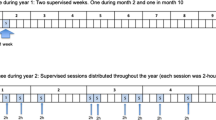Abstract
Mastering pediatric echocardiography (PE) requires a substantial knowledge base of echo theory and congenital heart disease (CHD), along with technical proficiency. Online self-directed learning has become increasingly utilized among medical trainees to promote competency within medical subspecialties. We sought to evaluate the impact of online learning combined with lecture-based and hands-on teaching on the acquisition of PE knowledge and confidence in pediatric cardiology and pediatric critical care fellows. We prospectively enrolled 124 learners from 2016 to 2019. These included 40 incoming cardiology and critical care fellows at Texas Children’s Hospital (TCH) as well as 84 national and international participants recruited from our online echo education website. All participants completed online learning modules through our website (www.pedecho.org), which covers pediatric echo physics, Doppler, technique, normal anatomy, atrial septal defects, and ventricular septal defects. TCH cardiology and critical care fellows subsequently participated in an Echo Boot Camp (BC), a 3-day training program with hands-on workshops and didactic lectures. Knowledge was assessed using an 80-question pre and post-test multiple choice exams. The online learning group demonstrated improvement in exam scores following online learning (PRE 49.1 ± 15.3 vs. POST 67.8 ± 17%; p ≤ 0.01). Echo Boot Camp fellows were noted to have further incremental improvement in test scores following BC (PRE 48% ± 13% vs. POST MODULE 68.6% ± 15% vs. POST BC 75.7% ± 13%; p ≤ 0.01). Self-assessment regarding confidence in context areas showed a substantial gain in self perceived interpretive confidence across all groups as well as procedural confidence in BC participants. Online learning significantly promotes the acquisition of echocardiography knowledge. Additional lecture-based and hands-on teaching in the form of an Echo Boot Camp can further enhance knowledge and interpretative skills. Both of these learning platforms appear to work in concert as powerful and effective tools in fellow education.





Similar content being viewed by others
References
Maskatia SA, Altman CA, Morris SA, Cabrera AG (2013) The echocardiography “boot camp”: a novel approach in pediatric cardiovascular imaging education. J Am Soc Echocardiogr 26(10):1187–1192. https://doi.org/10.1016/j.echo.2013.06.001
Mertens L, Friedberg MK (2009) The gold standard for noninvasive imaging in congenital heart disease: echocardiography. Curr Opin Cardiol. https://doi.org/10.1097/HCO.0b013e328323d86f
ACCF/AHA/AAP Recommendations for Training in Pediatric Cardiology (2005) A Report of the American College of Cardiology Foundation/American Heart Association/American College of Physicians Task Force on Clinical Competence (ACC/AHA/AAP Writing Committee to develop training recommendations for pediatric cardiology). Circulation 112(16):2555–2580. https://doi.org/10.1161/CIRCULATIONAHA.105.170308
Lai WW, Geva T, Shirali GS et al (2006) Guidelines and standards for performance of a pediatric echocardiogram: a report from the task force of the pediatric council of the American Society of Echocardiography. J Am Soc Echocardiogr 19(12):1413–1430. https://doi.org/10.1016/j.echo.2006.09.001
Benavidez OJ, Gauvreau K, Jenkins KJ, Geva T (2008) Diagnostic errors in pediatric echocardiography: development of taxonomy and identification of risk factors. Circulation 117(23):2995–3001. https://doi.org/10.1161/CIRCULATIONAHA.107.758532
Quiñones MA, Douglas PS, Foster E et al (2003) ACC/AHA clinical competence statement on echocardiography: a report of the American College of Cardiology/American Heart Association/American College of Physicians–American Society of Internal Medicine Task Force on Clinical Competence (Committee on Echocardiography). J Am Soc Echocardiogr 16(4):379–402. https://doi.org/10.1016/S0894-7317(03)00113-5
Kugler JD, Beekman RH III, Rosenthal GL et al (2009) Development of a pediatric cardiology quality improvement collaborative: from inception to implementation. From the Joint Council on Congenital Heart Disease Quality Improvement Task Force. Congenital Heart Dis 4(5):318–328. https://doi.org/10.1111/j.1747-0803.2009.00328.x
Hao M, Ippisch HM, Cook RS et al (2007) Implementation of an objective testing system in noninvasive cardiac imaging for evaluation of pediatric cardiology fellows. J Am Soc Echocardiogr 20(10):1211–1218. https://doi.org/10.1016/j.echo.2007.03.012
Thomas JD, Zoghbi WA, Beller GA et al (2009) ACCF 2008 training statement on multimodality noninvasive cardiovascular imaging. J Am Coll Cardiol 53(1):125–146. https://doi.org/10.1016/j.jacc.2008.10.004
Shappell E, Ahn J (2017) A needs assessment for a longitudinal emergency medicine intern curriculum. WestJEM 18(1):31–34. https://doi.org/10.5811/westjem.2016.9.31493
Maddry JK, Varney SM, Sessions D et al (2014) A Comparison of simulation-based education versus lecture-based instruction for toxicology training in emergency medicine residents. J Med Toxicol 10(4):364–368. https://doi.org/10.1007/s13181-014-0401-8
Ruiz JG, Mintzer MJ, Leipzig RM (2006) The impact of E-learning in medical education. Acad Med 81(3):207–212. https://doi.org/10.1097/00001888-200603000-00002
Little-Wienert K, Hsu D, Torrey S et al (2017) Pediatric emergency medicine online curriculum improves resident knowledge scores, but will they use it? Pediatr Emerg Care 33(11):713–717. https://doi.org/10.1097/PEC.0000000000000679
Walsh K, Rafiq I, Hall R (2007) Online educational tools developed by heart improve the knowledge and skills of hospital doctors in cardiology. Postgrad Med J 83(981):502–503. https://doi.org/10.1136/pgmj.2007.059501
Newberry L, Kennedy N, Greene EA (2016) Development of a subspecialty cardiology curriculum for paediatric registrars in Malawi: implementation of a long-distance hybrid model. Malawi Med J 28(2):57–60. https://doi.org/10.4314/mmj.v28i2.6
Friedl R, Höppler H, Ecard K, Scholz W, Hannekum A, Stracke S (2006) Development and prospective evaluation of a multimedia teaching course on aortic valve replacement. Thorac Cardiovasc Surg 54(1):1–9. https://doi.org/10.1055/s-2005-865871
Gold JP, Begg WB, Fullerton DA, Mathisen DJ, Orringer MB, Verrier ED (2005) Evaluation of web-based learning tools: lessons learned from the thoracic surgery directors association curriculum project three-year experience. Ann Thorac Surg 80(3):802–810. https://doi.org/10.1016/j.athoracsur.2005.03.052
Vollmar HC, Schürer-Maly C-C, Frahne J, Lelgemann M, Butzlaff M (2006) An e-learning platform for guideline implementation–evidence- and case-based knowledge translation via the Internet. Methods Inf Med 45(4):389–396
Windish R, Stuart P, Cruz R, Murray A (2019) Enhancing intern emergency medicine education using a combined didactic and web-based learning curriculum: the EDGE programme. Emerg Med Austral 31(5):837–842. https://doi.org/10.1111/1742-6723.13352
Funding
Not applicable.
Author information
Authors and Affiliations
Corresponding author
Ethics declarations
Conflict of interest
No disclosures and no conflict of interest.
Consent to Participate
Consent was obtained for all participants. This was an IRB approved study.
Consent for Publication
The author consent to have this manuscript published as an original work.
Additional information
Publisher's Note
Springer Nature remains neutral with regard to jurisdictional claims in published maps and institutional affiliations.
Rights and permissions
About this article
Cite this article
Kailin, J.A., Kyle, W.B., Altman, C.A. et al. Online Learning and Echocardiography Boot Camp: Innovative Learning Platforms Promoting Blended Learning and Competency in Pediatric Echocardiography. Pediatr Cardiol 42, 389–396 (2021). https://doi.org/10.1007/s00246-020-02494-w
Received:
Accepted:
Published:
Issue Date:
DOI: https://doi.org/10.1007/s00246-020-02494-w




